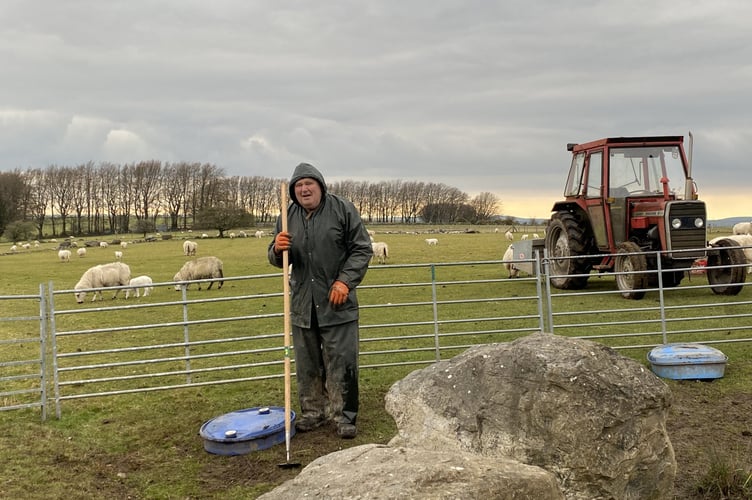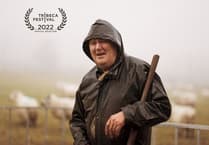Chances are you know of sheep farmer Wilf Davies, a shepherd from Cellan in south Ceredigion.
As sheep farmers go, Wilf is one of the most famous — they even made a movie about him. Yes, Wilf became known around the world when his life was documented in the Heart Valley film which premiered at the Tribeca film festival in New York. In that same festival, it was awarded the best short film of the year.
Despite his fame, Wilf has stuck to his neck of the woods, and he continues to peacefully farm his flock of Plynlimon Speckle Sheep
The Cambrian News joined him for a day in Cellan. No, fame hasn’t gone to his head.
The Welsh farmer may have captured the hearts of people across the world after featuring in the Heart Valley documentary, but the Cellan The valley is still the only place in the world, which remains cut to the shape of his heart.
Ever since he was a child, born in Cellan over 70 years ago, Wilf has always had one dream – to farm his own plot of land. Before this dream became a reality, he worked as a mechanic and builder, but the smell of oil could never replace the smell of the open air. So, 30 years ago, Wilf quit his job, and searched for a piece of land he could turn into a farm.
It was while he was on this search that Wilf left his homeland valley for the first and only time in his life. The dream of owning his very own farm, being the one thing enticing enough to pull him away as he travelled to England to look at a farm that was up for sale.
No one knows if the dream of owning his own farm would have pulled Wilf away from his home for good, because luck made sure he never had to ask himself that question. Not long after he visited the farm in England, Wilf managed to buy his perfect farm, sitting on the hilltops overlooking the Cellan valley.
Although he could now begin his new life as a shepherd, the skills Wilf learned in his old life continued to serve him well. He had to build a farm out of the land he had just bought. He needed fences, farming equipment and machinery, as well as barns and shelter for his animals. With a lifetime as a builder and mechanic behind him, Wilf knew exactly what needed to be done, and he was able to get most of it done with nothing more than his tools and his two hands.
Over the years, Wilf built everything he needed for the farm – two barns, feeding troughs and other equipment, as well as fences marking the full 40-acre perimeter of his farm.
On a normal day, the sheep farmer gets to focus on farming sheep, but sometimes, the day is filled with maintenance, whether that is a gap or break in the fence, a mechanical issue on the machinery or something else that is unexpected.
When Wilf met with the Cambrian News, he arrived on the farm with a van full of feed. As soon as he pulled up, he got out of the van, and was ready to begin unloading the nine sacks of food he had just bought.
The 74 -year-old then carried each 25kg sack into one of his barns, where he was greeted by a sheep that had recently become a mother to a group of lambs. Although the lambs were less than a week old, one had already got a reputation for being ‘troublesome’.
The mother and her lambs were kept in the barn to keep them safe from the other sheep, but in order to keep them safe from the troublesome lamb, she was kept by herself.
Once the sacks of feed were unloaded, Wilf began hand feeding his newest batch of lambs some bottled milk. But only after he managed to catch them.
For animals that had little experience using their legs, the lambs were spry and nimble, wriggling out of his hands, and squeezing under the gaps in fences, under their mother’s legs, or anything else they could fit through. The only way for Wilf to give himself a fighting chance, was to barricade them into a narrow passage. But even then, he still faced a battle.
Wilf took no time to savour his eventual victory in the battle to feed the lambs. Once it was done and the barriers were taken down, he moved straight on to the next task – a pile of logs that had been cut from a nearby tree. Armed with his wheelbarrow, the shepherd carried stacks of logs inside, and piled them on top of a heap of wood that already stretched across a third of the barn.

Once this was done, it was time for the main feed. But with nearly 100 sheep scattered across multiple fields, this wasn’t a straightforward task.
Before he could feed them, Wilf needed to round up the flock, and herd them into the feeding area. This is something he is usually able to do with his voice, but Wilf isn’t usually filmed by a reporter when he feeds the flock.
Wilf considers sheep to be very ‘smart animals’, he said they are very aware of their surroundings, especially if something is out of the ordinary.
Wilf said: “They don’t like anyone other than me. They can be very suspicious of people.” One of those ‘suspicious’ people was on the farm that day, meaning he needed more than his voice to get his sheep fed.
Knowing his animals well enough to expect this to be a problem, Wilf drove his Massey Ferguson 250 tractor up to the hilltop fields, and around every corner of his forty acre farm.
Using his tractor, the farmer rounded up all the groups of sheep into one big herd, combing back and forth to make sure all the stragglers and wanderers kept with the herd.
All the while, Wilf kept shouting ‘come on boys’ to get them to follow the well known voice of their shepherd.
The plan was a success, because despite the ‘suspicious’ looking reporter standing behind their feeding troughs, the sheep had been rounded up. The flock were now huddled around the feeding area fence, waiting to be let in for the chance to dive into their food.
He feeds his flock once a day, and although most sheep will manage to eat when food is put down for them. Some of them — between the rustle and commotion of 100 sheep packing tightly into a small corner of a field — can end up missing out on food. So when feeding time comes around on the next day, they are especially looking forward to it.
The problem gets worse when his two rams are put in the fields during breeding season. He called them both ‘real bullies’ because they will fight to protect their food, and fight when they want more.
Although the rams had already been moved out of the fields at the end of the breeding season, many mothers and their lambs were housed in their own fields so that they were well fed.
Wilf said the feeding is the most important part of the farming process. He said: “Sheep are very routine based animals, and they like their food. The key to farming sheep is that simple, keep them fed at the right time. Work like them, and match their routine.”
The sheep aren’t the only thing that he has had to work with. The weather is a big part of farming, and as Wilf said, it can often be the ‘biggest challenge.’ On the day he met with the Cambrian News, he was hoping for more sun to dry out the grass left damp by long periods of rain, but a problem of its own appears if there is too much sun. In order for the sheep to graze the grass, the weather needs to be perfect.
If the grass isn’t good enough for them to graze it, he has to make up the difference with the feed he buys himself, on top of the full 25kg sack he uses every day.
The weather also influences the kind of food Wilf will give the sheep. If the ground is wet, he will prefer using cob, because it ‘works better on the ground.’ A common place for food to end up when nearly 100 sheep stampede into the feeding area, and ‘but heads’ over who goes where.
No farmer has the luxury of only facing challenges when they are at the farm, and he is no different. At night, when he has returned home, problems in the form of predatory animals begin to prowl the farm – foxes, badgers, and crows.
Within the few months since the start of the year, and the few weeks since the spring breeding season. He has lost nine lambs to these night time predators. He’s lost five to foxes, two to badgers, and two to crows —the clues as to which predator came can be found in what parts of the animal are left behind, as well as the parts that weren’t.
He is particularly wary of crows, which he said ‘keep an eye out’ for the opportunity to attack at all times. They pick their prey with calculation and strike it when the opportunity presents itself. Wilf has tried various things over the thirty years he has owned the farm, but has accepted that he ‘can’t stop them.’ Crows attack sheep for only their eyes and tongue, leaving the majority of the animal to be found where it was killed.
The road is another constant danger to his flock, sometimes sheep can get spooked, sneak through an open gate, or break through a fence and end up on the road. Often, if one sheep has gotten out, there will be others that have too. “They’re stubborn animals, once they’ve made up their minds it’s hard to stop them. I’ve had them run out on the roads a few times, I’m very conscious of cars coming up. You do get affected by thinking about it.”
At the end of the day, “when the sun is in the right place”, Wilf goes for a walk along the country lane overlooking his farm and the valley. He said the road was built by the Romans when they occupied parts of Britain nearly 2,000 years ago. He appreciates building work because of his past as a builder. He has said that he has always wanted to see the Great Wall of China for that very reason, although he has never wanted to walk across it.
In his life, Wilf has many changes happen in the Cellan valley, as well as the country and the work he does. “The whole world is changing. How it’s changing really depends. These changes have made things better to a degree, farming for example is physically easier now, but at the same time, it’s much harder mentally. There’s no messing in farming these days.”
When asked about changes in his own life, he said: “I like living the same life, it’s good for me.”
Although he sticks to the same routine, and still carries on a 10-year tradition of eating the same meal everyday - two pieces of fish, an onion, an egg, baked beans and biscuits. One thing that has changed is the addition of a lemon Treacle cake, brought to him by Kiran Sidhu, the writer and co-producer of the Heart Valley documentary, and a friend to the sheep farmer.
Ms Sidhu is working on a book called I Can Hear the Cuckoo which was inspired by the lessons she learned from people such as Wilf while she has been living in Cellan.
“The book itself is about the loss of my mother, and my choice to move from London to Cellan. It’s about the community I’ve met there and how being here has allowed me to reflect on my life, and find more poignancy in the things that make it up.
“I learned a lot from Wilf, he’s lived a very different life to the one I have. I’ve always thought that variety is the spice of life, but he taught me the value of being still. I used to think he works alone and in silence, but doesn’t. He’s tuned to a different frequency, one that I’d never plugged into. Sometimes participating in life is sitting still within it, Wilf taught me that.
“It was Wilf that taught me about the cuckoo bird, as well the timings of the earth and nature. There’s a time the lambs arrive and a time when the cuckoo arrives.
“Wilf really taught me to be still, to listen and hear sounds that I hadn’t heard before. Without him, I wouldn’t be able to sit still enough to listen to that. I’ve learned a lot from the friendships I’ve made here, and I definitely live much more potently now thanks to them.
“I remember him telling me that he walks along the road at the top of the hill, he said ‘there’s a panoramic view, and everything looks so small, and everything feels so perfect.’ I do that walk now, sometimes I see life the way he does when I’m up there. I really appreciate that new perspective.”

.png?width=209&height=140&crop=209:145,smart&quality=75)



